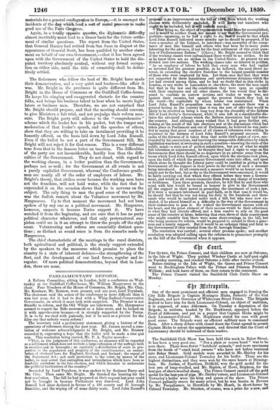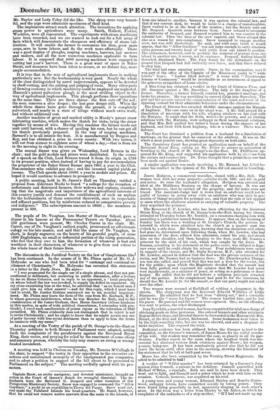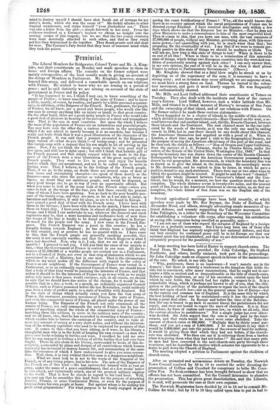Cht 3littrufo1io.
One of the most prominent and efficient men engaged in. forming the City Rifle Brigade is Captain Montague Hicks, formerly of the 41st Regiment, and now Governor of Whitecross Street Prison. The Brigade desired to have him for their Lieutenant-Colonel, an object of ambition, it is supposed, of some Aldermen. On Tuesday a deputation of the Brigade, in uniform, headed by Mr. Hopkinson, appeared before the Court of Aldermen, and put in a prayer that Captain Hicks might be their Lieutenant-Colonel. Mr. Hopkinson stated his case with great good sense. The Brigade want an efficient military man to command them. After a sharp debate with closed doors the Court agreed to permit Captain Hicks to accept the appointment, and directed that the Court of Lieutenancy should be informed of their resolve.
The Smithfield Club Show has been held this week in Baker Street. It has been a very good one. "Not a plain or coarse beast" was to be seen there. There were fewer " butchers' animals," and more specimens from the herds of " crack local owners" who have not before ventured into Baker Street. Gold medals were awarded to Mr. Shirley for his steer, and Lieutenant-Colonel Towneley for his heifer. These are the highest distinctions, and they were won by the same beasts at Birming- ham. Mr. Jordan, of Eastburn, Driffield, won the gold medal for the best pen of long-woolled, and Mr. Rigden, of Hove, Brighton, for the best pen of short-woolled sheep. The Prince Consort carried off the gold medal for the beat pen of pigs. Mr. Shirley's steer, and Lieutenant-Colonel Towneley's heifer were the king and queen of the show. The Prince Consort gallantly strove for many prizes, but he was beaten in Devans by Mr. Farquharson, in Herefords by Mr. Heath, in short-horns by Colonel Towneley. Mr. Stratton, of course, won a prize for a cow, aid
Mr. Naylor and Lady Foley did the like. The seep were very beauti- ful, and the pigs were admirable specimens of their kind.
The implements attract much attention. The inventions for applying steam power to agriculture were many. Smith, Halkett, Fowler, Woolston, were all represented. The experiments with steam machinery have been recorded, and we are warned to look out for a full array of facts which will demonstrate the cheapness and efficiency of steam cul- tivation. It will enable the farmer to economize his time grow more crops, save in horse labour, and do the work more effectually. There was a good display of ploughs, reaping machines, harrows, hay mowers and makers, and all the now numerous machines applicable to farm labour. It is supposed that 4000 mowing machines were engaged in cuttihg last year's harvest. There is a great want of space in Baker Street, and measures have been taken to secure, at no distant day, more ample accommodation.
It is true that in the way of agricultural implements there is nothing particularly new. But the workmanship is very good. Nearly the whole of the class distinguished by novel improvements, appears to be devoted to chaff-cutting, and the cutting and pulping of roots. Many other parts of farming economy in which machinery could be employed are neglected. Hancock's patent pulverizer plough is the most striking object in the way of agricultural. implements. This plough performs three operations at the same time. There are three shares : the first cuts off the sod ; the next removes a slice deeper; the last goes deeper still. When the whole three shares have gone through the ground, it is completely pulverized, and nearly in a state of tillage without much extra work, and without additional. cost Another machine of great and marked utility is Moody's patent straw fabricating machine, which makes the thatch for ricks, tying the straw together by means of wire. Having this machine the farmer needs not wait until harvest, with a chance of spoiling his corn, buthecangetali his thatch previously prepared. In the way of reaping machines, Bamard's is to all intents the best. It is manufactured by Burgess and Key, and has obtained a prize in every county. With two horses, it will cut from sixteen to eighteen acres of wheat a day,—that is from six in the morning to eight in the evening.
The annual dinner was given on Wednesday, Lord Berners in the chair ; and the gold medals and prizes were distributed. In the course of a speech on the Club, Lord Berners traced it from its origin in 1798 to its present position, when instead of having to pay for accommodation the proprietor of the Baker Street Bazaar pays 700/. a year to the Club. Non-members who exhibit pay also and the invested capital yields an income. The Club spends about 10901. a year in medals and prizes. He hoped it would continue to advance in prosperity.
A public meeting, held in St. James's Hall on Thursday, ratified a proposal from Alderman Mechi te found "a college for the reception of unfortunate and distressed farmers' their widows and orphans, consider- ing that the magnitude and importance of the agricultural interests of this country justify and demand the establishment of such an asylum for the befriendment of these connected therewith, once in respectable and affluent positions, but by misfortune reduced to comparative poverty and indigence." The subscriptiona amount to 18001.; the members at present to 500.
The pupils of Dr. Vaughan, late Master of Harrow School, gave a dinner in his honour at the Freemasons' Tavern on Tuesday. About 250 gentlemen were present, Mr. Charles Caner in the chair. Mr. Currer, one of Dr. Vaughan's earliest pupils, pronounced an affectionate eulogy on his late master, and said that the name of Dr. Vaughan, in short, is deeply engraven on the hearts of his grateful pupils, of some 1800 Englishmen, no small or influential portion of the rising generation, who feel that they owe to him the formation of whatever is best and worthiest in their characters, of whatever is to give form and colour to the whole tenor of their future lives.
The discussion in the Juridical Society on the law of blasphemous libel has been continued. In the course of it Mr. Phinn spoke of Mr. G. J. Holyoake as one who had been tried for "contempt and continual re- vilement of Christianity." Mr. Holyoako has corrected this abatement in a letter to the Daily Hews. He says-
" I was prosecuted for the single use of a single phrase, and that not pre- meditated or deliberate, but occurring in public discussion, after a lecture by me on Home Colonies, and in reply to an opponent, a 'local preacher,' on whose behalf the law was invoked, to supply his defect in argument. On my cross-examining him at the trial, he admitted that as an honest man I could give him no other answer '—and for this reply, which I must have lied to avoid, Mr. Justice Erskine sentenced me to six months' imprison- ment. Mr. Phinn may learn the facts of the case from Mr. Roebuck, M.P., to whose generous interference, when he was Member for Bath, and to the consideration of Sir James Graham, then Home Secretary (whose kindness in this matter, in spite of wide political dissentience, I remember with gra- titude), I owed such amelioration of prison rigour as the toleration of 1842 permitted. Mr. Phinn evidently does not distinguish that to reject is not to revile Christianity ; and he ought to know that he might accuse any one of petty larceny with less social detriment than to apply to him the terms he connects with my name."
At a meeting of the Vestry of the parish. of St. George's-in-the-East on Thursday petitions to both Houses of Parliament were adopted, setting forth the complaints of the parishioners against the Reverend Bryan Ring, their rector, and praying for relief by the enactment of.some cheap and summary proem, whereby the laity may remove an erring or wrong- headed incumbent.
A meeting was held in Chelsea on Tuesday, Mr. Torrens M'Cullagh in the chair, to support "the vestry in their opposition to the excessive ex- actions and unrestrained monopoly of the amalgamated gas companies, and to adopt a petition in support of the bill about to be presented to Parliament on the subject." The meeting cordially agreed with its pro- moters.
Captain Snow, an arctic navigator, and devoted missionary, brought an action in the Court of Queen's Bench for wrongful dismissal. The de- fendants were the Reverend G. Despard and other members of the Patagonian Missionary Society. Snow was engaged to command the "Allen Gardiner," a yacht in an expedition to Tierra del Fuego. Snow went out, and made the Falkland Islands his head-quarters. He found, however, that he could not remove native converts from the main to the islands, or from one island to another, because it was against the colonial law, and that if any convert died, he would be liable to a charge of manslaughter. Snow wanted to be at the head of the mission ; but the Society sent out
Mr. Despard. Quarrels arose between them. now refused to recognizethe authority of Despard, and Despard required him to run counter to the
colonial law. Then the time of the crew expired, and Snow alleged this also as a reason for non-compliance. Snow managed to engage another crew, but was still disobedient. He said, and with some truth it would appear, that the "Allen Gardiner" was not large enough to carry nineteen extra persons and twenty head of wild cattle from one island to another. The ordinances, however, said to prohibit the removal of persons from one island to another are, it seems, not in existence. Despard, finding himself thwarted, dismissed Snow. The Jury found for the defendants on the ground that Despard had full authority over Snow, and that Snow refused to obey him.
The trial bad some amusing points. Snow, in his examination, says it was part of the office of the Captain of the Missionary yacht to "write letters" home. "Ladies liked. letters." A scene with "Troublesome Jemmy or Cassimoora" would be invaluable as an instrument of appeal to the generous sympathies of home circles.
A Mies Crisp has obtained a verdict in the Court of Common Pleas, and 501. damages against a Mr. Smoothey. The lady is the daughter of a farmer. Smoothey, a farmer himself, courted her, .promised marriage, and broke his promise. He was unwilling to convert Crisp into Smoothey. The girl and her parents earned the commendation of the court and even of the opposing counsel for their admirable behaviour under the circumstances.
The Court of Divorce has awarded 10,0001. damages against the Marquis of Anglesey. The ease came on in the usual way. A Mx. Bell prayed for a dissolution of marriage with his wife, alleging adultery on her part with the Marquis. It seems that the Bells, well-to-do persons, and on visiting relations with the Marquis, were unhappy in their matrimonial relations, and that Mrs. Bell quitted her father's house during the absence of her husband, and lived with Lord Anglesey, who is a widower. There was no defence.
The Court has dismissed a petition from a husband for a dissolution of marriage, on the ground that he connived at the adultery. It was on the whole a most painful ease, showing great depravity on both sides.
The Consistory Court has granted an application made on behalf of the Reverend Bryan King, calling up Mr. Rosier to answer an accusation of brawling in the church of St. Goorge's-in-the-East. Dr. Phillimore ap- peared for Mr. King, and supported his application both by citations from the statute and common law. Dr. Twists thought that a prim& facie case had been made out against Rosier.
A similar application was made involving a Mr. Barnard, but failed be- cause his conduct in the opinion of Dr. Twiss did not amount to brawling.
James Hodgson, a commercial traveller, eloped with a Mrs. Bell. The woman took with her some property—articles worth 100/. and 451. in gold and notes. So runs the husband's allegation. Hodgson was arrested and tried at the Middlesex Sessions on the charge of larceny. It was not shown, however, that he carried off the property, and the notes were not traced. The Assistant-Judge laid it down that an adulterer could not be guilty of larceny in going away with an adultress who was only in pos- session of things requisite for personal use, and that the rule of law applied to cases where the adulterer assisted in carrying off valuable property. The Jury acquitted the prisoner.
The Reverend C. F. Lowder, who has been officiating for the Reverend Bryan King at the church of St. George's-in-the-East during his illness, attended on Thursday before Mr. Yardley, on a summons charging him with assaulting a parishioner named Beanies. It appears that on the morning of Sunday last there was a wedding at St. George's Church, the persons in- terested in which were admitted into the church at a quarter past ten o'clock by a side door. Mr. Soames, knowing that the choristers and others bad gone in, determined upon following them, when Mr. Lowder, who had possession of the door, refused him admission, raised his arm, and struck him on the shoulder, and then, banging to the door, made Mr. Soamea a prisoner by the skirt of his coat, which was caught by the doors. Mr. Soames, according to his statement at the police court, was obliged to ham- mer away until he could obtain his release. Four parishioners were called in support of the charge, and Mr. Digby Seymour, M.P., who attended for Mr. Lowder, argued in defence that the door was the private entrance of the rector, and Mr. Soamea had no business there. Mr. Churchwarden Thomp- son was also called, and proved that this was not a door for the rector, but for the public ; upon which the Magistrate decided that the assault had been fully proved, and expressed his opinion that Mr. Lowder had acted very injudiciously, as a minister of peace, in acting as a policeman or door- keeper. He added that he did not believe a religious principle actuated any of the !parties. As the complainant had paid 2s. for the summons, he should fine Mr. Lowder 2s. for the assault, so that one party might not exult over the other.
Two women were accused at Guildhall of robbing a clergyman in the streets. The clergyman was the Reverend Edward Williams of Little Stanmore. He admitted that he had been "dining out," and a constable said he was the "worse for liquor." The women hustled him, and he lost his purse. He pursued and the women were captured. One, an old offender, was sent to prison, the other discharged.
Jane Tyrwhitt, a married woman, has been committed for trial on a charge of obtaining goods on false pretences. She ordered bonnets and other articles in Regent Street shops, and directed them to be forwarded to the Honourable Mrs. Stuart, at the Star and Garter, Richmond. Some tradesmen were taken in by the high-sounding title, but one was too shrewd, and sent a shopman to make inquiries. This exposed the trick.
Sufficient evidence has been adduced before the Coroner to lead to the committal, on the Coroner's warrant, of James Moore for the wilful murder of his wife. Our readers may remember the case, so ghastly in all its par- ticulars. Further search in the room where the headless trunk was dis- covered has disclosed various fresh evidences against Moore ; his weapon, a razor, being one. It has been conclusively proved also that he did not leave the house until after nine in the morning, showing the falsehood of his statement that he left at half-past seven.
Moore has also been committed by the Worship Street Magistrate. He asked to be admitted to bail!
A verdict of "Wilful murder" has been returned by a Coroner's Jury against John Connell, a private in the Artillery. Connell quarrelled with Michael O'Brien, a comrade. Both are said to have been drunk. They went out to fight, and Connell used a poker which he took with him on the occasion. Connell, however, was accputted on his trial.
A young man and young woman, Edmund Shirley and Rosetta Green- wood, unhappy lovers, have committed suicide by taking poison. They
were found lying peacefully in bed, apparently sleeping in each other's arms. In the room WBB a letter from Shirley to h.0 father, in which he complains of the unkindness of a step-mother. "If I had not made up my mind to destroy myself I should have shot Sarah out of revenge for my sister's death, which she was the cause of." He darkly alludes to other tragical occurrences, and styles himself "your disobedient son." There was also a letter from the girl—a simple farewell to her aunt. From the evidence tendered at a Coroner's inquest we obtain no insight into the moving causes of this tragedy, but we see that the two young creatures were most devotedly attached to each other, and that as they could not live they determined to die together. They drank prussic acid and slept for ever. The Coroner's Jury found that they were of unsound mind when they took the poison.




























 Previous page
Previous page